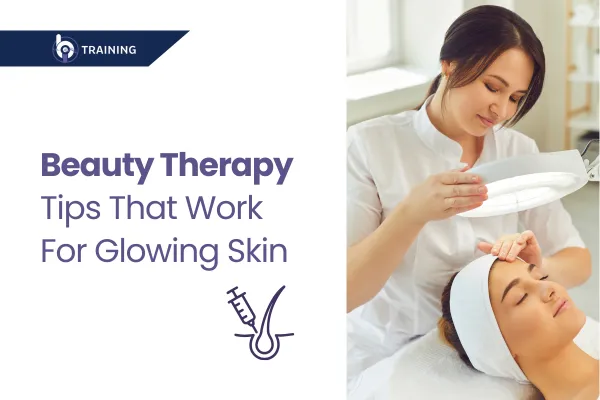
Beauty Therapy Tips That Work for You
Beauty Therapy Tips That Work for Glowing Skin
Beauty therapy is often seen as something exclusive to high-end spas or beauty salons, but in reality, it’s something anyone can enjoy at home. Whether you want to pamper yourself after a long day or need to manage skin issues, there are simple and effective beauty therapy tips you can incorporate into your daily routine. These tips are based on real, research-backed advice, meaning you don’t need to rely on trends or unproven methods. Instead, focus on proven techniques that will help you feel refreshed, confident, and beautiful from the inside out.
1. Understand Your Skin Type First
Before diving into beauty therapy treatments or choosing products, it’s essential to understand your skin type. Skin care isn't one-size-fits-all; what works for one person might not work for another. The four main skin types are oily, dry, combination, and sensitive, and each requires a unique approach to skincare. Identifying your skin type will help you choose the right products and prevent issues like irritation, dryness, or excess oil production. You can determine your skin type through a simple test. Wash your face with a gentle cleanser and leave it bare for an hour. If your skin feels tight or flaky, you may have dry skin. If it’s shiny within a few hours, you likely have oily skin.
Tip: Perform a patch test on your jawline when trying new products to ensure they’re safe for your skin.
2. Keep Skincare Simple and Consistent
Many people make the mistake of overloading their skin with too many products in an attempt to address every concern. However, the key to great skin is a simple, consistent routine. Studies have shown that keeping skincare minimal can reduce irritation and allow your skin to thrive. The basic steps of a good skincare routine are cleansing, moisturizing, and protecting your skin with sunscreen. It’s also important to be consistent with your routine. Even the best products won’t work if they’re used irregularly.
3. Use Facial Massage for Circulation
Facial massage isn’t just a relaxing luxury; it’s an effective way to improve blood flow, encourage lymphatic drainage, and boost skin elasticity. A study conducted by researchers in Japan showed that regular facial massage can help improve the skin’s appearance by promoting circulation and helping the skin repair itself. You can use your fingers or a facial roller to gently massage your face in upward strokes. Doing this for just a few minutes a day can help with puffiness and improve your skin's tone and texture.
Tip: Using a cold roller can be especially helpful for reducing morning puffiness and giving your skin a refreshed look.
4. Hydrate From the Inside and Outside
Hydration plays a crucial role in maintaining healthy, youthful skin. While drinking plenty of water is vital for skin health, it’s equally important to use hydrating products. Dry skin can lead to wrinkles, flakiness, and irritation. One of the best ways to ensure your skin stays hydrated is by using products that contain hyaluronic acid. This ingredient can hold many times its weight in water and helps maintain moisture levels in the skin. But hydration isn’t just about skincare products; you should also be drinking enough water to stay hydrated from the inside.
Fun Fact: Drinking enough water daily can help reduce the appearance of fine lines and keep your skin plump.
5. Exfoliate—But Don’t Overdo It
Exfoliating is an essential step in any skincare routine. It helps remove dead skin cells, which can otherwise make your complexion appear dull and uneven. However, exfoliation should be done in moderation. Over-exfoliating can lead to irritation and even make your skin more sensitive. Aim to exfoliate 2–3 times a week using a mild exfoliant like glycolic acid or a gentle scrub. If your skin is sensitive, try exfoliating once a week.
6. Prioritize Sleep as a Beauty Essential
Sleep is not just important for your overall health; it plays a critical role in your skin’s appearance. When you’re sleep-deprived, your body’s production of collagen and elastin decreases, making skin appear dull and more prone to wrinkles. According to dermatologists, good sleep allows your skin to repair itself and maintain a youthful glow. Aim for 7–9 hours of sleep each night to support skin health.
Tip: Maintain a consistent sleep schedule and try using a silk pillowcase to prevent creases and hair breakage.
7. Incorporate Stress Relief Techniques
Stress is a significant factor in many skin problems, including acne, eczema, and other inflammatory conditions. Stress triggers the release of cortisol, a hormone that can increase oil production in the skin and contribute to breakouts. Incorporating stress relief techniques into your routine, such as yoga, deep breathing, or even a warm bath, can help lower stress levels and reduce their impact on your skin. Mindfulness and meditation can also play a role in improving your overall skin health.
Research: A study published in Clinical and Experimental Dermatology found that practicing mindfulness reduced skin conditions related to stress by 30%.
8. Use Sun Protection Every Single Day
One of the most important beauty therapy tips is to wear sunscreen every day, no matter the weather. UV rays from the sun are responsible for a significant amount of premature skin aging, including wrinkles, pigmentation, and sunspots. Even on cloudy days, UV rays can penetrate your skin and cause long-term damage. Dermatologists recommend using a broad-spectrum sunscreen with an SPF of 30 or higher every day. Applying sunscreen is the easiest way to protect your skin from harmful UV damage and maintain a youthful appearance.
Tip: Reapply sunscreen every two hours if you’re outdoors for an extended period.
9. Avoid Skincare Fads Without Research
It can be tempting to jump on the latest skincare trends, especially when they go viral on social media. However, many of these trends lack scientific backing and can even be harmful. For example, using ingredients like lemon juice or toothpaste on your skin can cause irritation and damage. Always do your research before trying new products or treatments. Consult with a dermatologist or licensed esthetician if you're unsure about a particular product or technique.
Important: Always test a new product on a small area of your skin before applying it to your whole face.
10. Healthy Eating Supports Skin Health
What you eat directly affects your skin. A diet rich in antioxidants, vitamins, and healthy fats can promote clear, glowing skin. Omega-3 fatty acids found in fish, nuts, and seeds can help keep your skin hydrated and reduce inflammation. Vitamin C-rich foods like citrus fruits and berries can support collagen production, while zinc found in nuts, seeds, and legumes can help with acne prevention. Cutting back on processed foods and sugar is also beneficial for maintaining clear, youthful skin.
Quick Tip: Include more fatty fish like salmon in your diet to help keep your skin smooth and well-hydrated.
11. Regular Exercise Can Improve Skin Tone
Exercise benefits your skin just as much as it benefits your overall health. Physical activity increases blood flow, which delivers more oxygen and nutrients to skin cells, helping your skin repair itself and look healthier. Cardiovascular exercise, such as running or cycling, is especially good for promoting circulation. Plus, exercise helps reduce stress, which can have a direct positive effect on your skin. Just make sure to cleanse your face after working out to remove sweat and prevent breakouts.
Bonus Tip: Yoga is also great for both your mental health and skin health, as it helps reduce stress and promotes circulation.
12. Professional Treatments: When and Why
While a good at-home skincare routine can work wonders, sometimes professional treatments are needed to address more severe skin concerns. Chemical peels, microdermabrasion, and LED light therapy are treatments that have been shown to improve skin tone, texture, and overall health. Consulting with a licensed dermatologist or esthetician is the best way to determine which treatments are right for you. Professional treatments can give you quicker, more noticeable results, but they should complement, not replace, your daily skincare regimen.
Reminder: Always choose licensed professionals for any in-office treatments to ensure safety and effectiveness.
13. Know the Difference Between Self-Care and Skincare
While skincare is an important part of self-care, true beauty therapy goes beyond products and treatments. Mental and emotional well-being play a huge role in your skin’s health. Practicing self-care routines that include relaxation, stress management, and positive self-talk can improve your overall beauty. When you feel confident and calm, it will show on your skin. Beauty isn’t just about what you put on your skin—it’s also about how you treat your body and mind.
Note: Smiling more often can make a big difference in how others perceive you and how you feel about yourself.
Conclusion
Beauty therapy tips that work come down to simple, consistent habits that support your skin and overall well-being. By understanding your skin type, sticking to a minimal skincare routine, prioritizing hydration, and managing stress, you can achieve radiant, healthy skin. While professional treatments can help with specific issues, a daily routine of healthy habits is the foundation of long-term skin health. Start small, be consistent, and remember that beauty is about more than just appearance—it’s about feeling good inside and out.
FAQs
1. How can I identify my skin type?
Wash your face and leave it bare for an hour. If it feels tight, you have dry skin; if oily, you have oily skin.
2. How often should I exfoliate my face?
Exfoliate 2–3 times a week to remove dead skin cells without causing irritation or dryness.
3. Is it necessary to use sunscreen every day?
Yes, sunscreen should be applied daily to protect your skin from UV damage, even on cloudy days.
4. Can exercise improve my skin health?
Regular exercise boosts circulation, helping deliver nutrients to the skin and reducing stress, which benefits your complexion.
5. Are professional treatments worth it for skin concerns?
Professional treatments like chemical peels offer quicker results for specific skin issues, but should complement a daily skincare routine.
